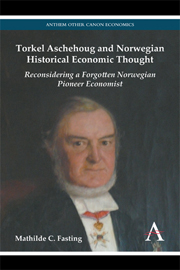 Torkel Aschehoug and Norwegian Historical Economic Thought
Torkel Aschehoug and Norwegian Historical Economic Thought Book contents
- Frontmatter
- Contents
- Acknowledgements
- Chapter 1 Introduction
- Chapter 2 Biography
- Chapter 3 Norwegian Economic and Political Context in the Nineteenth Century
- Chapter 4 Norwegian Economic Thought and Method
- Chapter 5 Development of the Economic Thought of Aschehoug: Statsøkonomisk Forening and the Socialøkonomik Project
- Chapter 6 The German Historical School: Similarities, Influences and Discrepancies
- Chapter 7 Alfred Marshall: Aschehoug and the Adoption of Marginal Theory
- Chapter 8 The French Influence: Adopting Say and Refuting Socialism
- Chapter 9 Views of Labour in the Work of Aschehoug
- Chapter 10 The Entrepreneur: The Fourth Production Factor
- Chapter 11 Trade and Customs Debates from 1840 to 1906
- Chapter 12 The Theory of Economic Crises
- Chapter 13 The Legacy of Aschehoug: Concluding Remarks
- Appendix A Other Norwegian Turn-of-the-Century Economists
- Appendix B Drafts for Socialøkonomik
- Appendix C Detailed Contents of Socialøkonomik (First Editions from 1903 to 1908)
- Notes
- Literature
- Index
Appendix A - Other Norwegian Turn-of-the-Century Economists
Published online by Cambridge University Press: 05 March 2014
- Frontmatter
- Contents
- Acknowledgements
- Chapter 1 Introduction
- Chapter 2 Biography
- Chapter 3 Norwegian Economic and Political Context in the Nineteenth Century
- Chapter 4 Norwegian Economic Thought and Method
- Chapter 5 Development of the Economic Thought of Aschehoug: Statsøkonomisk Forening and the Socialøkonomik Project
- Chapter 6 The German Historical School: Similarities, Influences and Discrepancies
- Chapter 7 Alfred Marshall: Aschehoug and the Adoption of Marginal Theory
- Chapter 8 The French Influence: Adopting Say and Refuting Socialism
- Chapter 9 Views of Labour in the Work of Aschehoug
- Chapter 10 The Entrepreneur: The Fourth Production Factor
- Chapter 11 Trade and Customs Debates from 1840 to 1906
- Chapter 12 The Theory of Economic Crises
- Chapter 13 The Legacy of Aschehoug: Concluding Remarks
- Appendix A Other Norwegian Turn-of-the-Century Economists
- Appendix B Drafts for Socialøkonomik
- Appendix C Detailed Contents of Socialøkonomik (First Editions from 1903 to 1908)
- Notes
- Literature
- Index
Summary
The core group of economists consists of Ebbe Hertzberg (1847–1912), Bredo Morgenstierne (1851–1930) and the younger generation, Oskar Jaeger (1863–1933) and Peder Thorvald Aarum (1867–1926). In addition, Anders Nicolai Kiær (1838–1919) and Nicolai Rygg (1872–1957) respectively a statistician and a jurist, were both appointed chairman of Statistisk centralbureau (later Statistisk sentralbyrå or SSB). The latter was, for a short period of time, the successor to Aschehoug as a professor of economics before he became the general manager of Statistisk centralbureau in 1913.
Ebbe Hertzberg, at only 30 years old, was appointed the first professor of economics and statistics in Norway in 1877 after winning a competition. He was a lawyer, an economist and a historian. He was, as commented on in Chapter 3, a strong adherent of Schweigaard, giving him his full approval in his book published in 1883 about Schweigaard and his public affairs. Due to personal reasons, Hertzberg was forced to resign from his post as professor of economics after just a few years in 1886, and he did not take part in the economic debate until the mid-1890s. Aarum later states that Hertzberg had studied with Karl Knies (1821–1898) in Heidelberg and that he was influenced by the historical school. Like Aschehoug, he lectured and published in Statsøkonomisk Tidsskrift.’
Hertzberg chose ‘Statssocialismens theori’ (The theory of state socialism) as his topic for the first lecture at the Statsøkonomisk forening in 1884.
- Type
- Chapter
- Information
- Torkel Aschehoug and Norwegian Historical Economic ThoughtReconsidering a Forgotten Norwegian Pioneer Economist, pp. 189 - 194Publisher: Anthem PressPrint publication year: 2013


